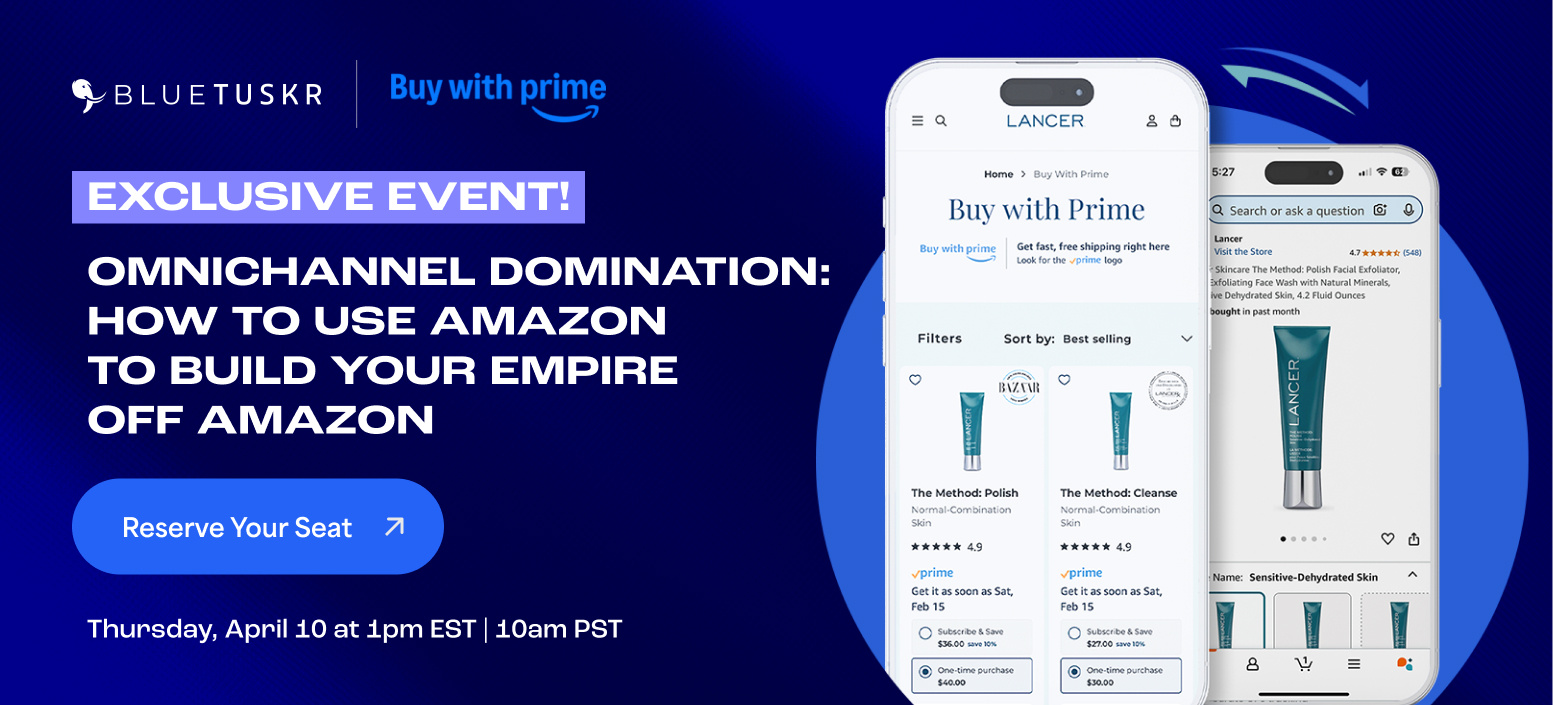
Klaviyo vs. MailChimp: Which is Better for E-Commerce Sellers?
With the average person receiving 100 to 120 emails daily, the race to stand out and get clicks intensifies. Email marketing campaigns are among the most effective ways to reach online shoppers. However, the efficiency and conversion rate of your campaigns are heavily dependent on the email marketing platform you use.
And, on top of the right email marketing software, your content marketing strategy and audience targeting also play a crucial role in the success of your email campaigns.
Now, let's take a closer look at Klaviyo and Mailchimp and compare their features for e-commerce sellers. Then you can decide which one is best for your online store.
What Klaviyo Offers
Let’s start with the features these email marketing tools offer. The aim is to get clicks that will entice online shoppers to check out your eCommerce store. Will Klaviyo live up to its name and take up this essential task?
Companies often expect $45 for every dollar spent on email marketing. That is a juicy statistic, given the competitive nature of eCommerce. Klaviyo cashes in on this positivity, offering a range of features to help e-commerce sellers create effective email campaigns.
Features
Klaviyo offers a number of features, including phone push notifications (SMS campaigns). However, we are more concerned with how it boosts your bottom line.
With that in mind, here is a brief look at some of the top features of Klaviyo:
ECommerce Integration
Quick and seamless integration with eCommerce platforms is one of the most essential features for an email marketing platform. Klaviyo integrates with Shopify, WooCommerce, BigCommerce, Wix, PrestaShop, etc. Hence, running email campaigns is easy for eCommerce businesses.
One vital ingredient to success is understanding your customers. You can run SEO on your eCommerce store to match keywords from your customers.
This email marketing tool lets sellers collect real-time customer data. Then, you can implement advanced customer segmentation and create emails that your customers really want.
Campaigns
Integration with popular eCommerce platforms is a plus, but Klaviyo comes into its own with campaigns. The email marketing platform offers several essential tools for an effective marketing strategy. They include the following:
- Email marketing automation tools
- Segmentation features
- Pre-built templates
- Customer profiles for personalized messages
- Drag and drop functionality for templates
- Signup forms
Klaviyo users will enjoy these, from automation features to easy template edits. The marketing tool builds this functionality from behavioral data. One of the byproducts is time optimization, which sends emails when your customers are most ready to view them.
Automation and segmentation are crucial in email campaigns, especially for small business owners. You might not have the time to personalize and send messages. Taking advantage of automation leaves you with more time to focus on other areas.
With 72% of successful email campaigns reporting personalization as a common theme, you should consider it. The question is not about how many subscribers you have but how effectively you use customer data to boost sales.
Segmentation
Your customer data will reveal different preferences as shoppers visit eCommerce stores. Klaviyo offers segmentation features designed specifically for grouping customers. Therefore, you can create groups based on purchase history and behavioral data.
Klaviyo’s predictive analytics can also help with predictions. This will give you insight into what your customers may want.
Pricing
Pricing plays also comes into play when deciding on an email marketing platform.
In general, Klaviyo offers affordable services. You can quickly integrate it with your existing online store at no cost. However, you’ll be limited to basic features like email support for 60 days and 500 monthly emails.
The free plan is the perfect start for small business owners as they get new subscribers. But, you’ll need the pricier plan if you run a large online store with many email subscribers. That costs $60 monthly, and it includes email and SMS marketing.
What Mailchimp Offers
MailChimp is an equally robust email marketing tool, almost enough to tip the scales in this Klaviyo vs MailChimp piece. It offers integrations that can help with your marketplace marketing. You’ll also find more advanced tools, including predictive analytics.
MailChimp offers more than a platform for sending emails. You can craft your marketing campaign to follow the customers as they move through your sales funnel. The tool even offers robust features for those who do not yet have an online store.
Features
MailChimp offers the following:
Marketplace Integrations
One must first get customer data before sending automated emails. How, then, would you know what to send? Both MailChimp and Klaviyo offer marketplace integrations that pull customer data from existing online stores.
The platform uses this information to facilitate highly targeted campaigns. It even advises users to aim for an open rate of 21.33%, although the rate differs for other industries.
Some supported marketplaces include Shopify and WooCommerce.
Automation
Automated emails save time, allowing you to focus on other aspects. Fortunately, MailChimp offers email automation features, including the following:
- Transaction emails
- Retargeting ads
The transaction emails will update shoppers on their purchase activities. That creates a connection with them on a personal level, showing that you care. On the other hand, retargeting ads help recapture the attention of visitors.
These are aspects you cannot deal with daily. Small businesses may have less work, but you can only follow so much data. MailChimp analyzes customer profiles and sends pre-programmed emails.
Abandoned cart recovery is vital to online sales. So, you must be ready to retarget shoppers who have added items to their carts without checking out.
Insights
MailChimp users can use predictive analytics to predict their best customers. A data-driven campaign focusing on customer behavior is bound to be effective, despite all odds.
You can test different subject lines and see which gets the most clicks. Then, you can review audience insights, campaign revenue, etc. This can be a powerful addition to third-party reports like Google Analytics.
Pricing
You can start with the free plan. The subscription offers 1,000 emails and email support for the first 30 days. Furthermore, it has limited pre-built email templates.
The free subscription lets you access the landing page builder and other creative tools. The premium plan costs $360 monthly, more than what Klaviyo offers. While that is expensive, you can test multiple subject lines, get phone support, access over 300 integrations, and more.
MailChimp’s Essentials plan offers more features, with the first month free with the free plan. It is ideal for testing the platform.
Comparing Klaviyo and MailChimp
Effective marketing is one way to scale your eCommerce business. While we have advertising, email marketing brings your online store closer to your customers. Here is how Klaviyo compares to MailChimp:
Pricing
Klaviyo’s most expensive plan costs $60, while MailChimp offers a premium plan for $350 monthly. While one might consider Klaviyo the cheaper option, both subscriptions have varying features. Also, Klaviyo costs $1,350 for 150,000 monthly emails, compared to MailChimp’s $350.
Marketing Features
Klaviyo’s specialty is email marketing, and it has robust features for effective campaign activity. Unlike MailChimp, it also adds SMS marketing to round off the outreach.
MailChimp takes things beyond sending emails. It still offers predictive analytics via customer data but adds other tools. You’ll find a landing page builder, email automation for the customer journey, creative tools for videos, polls, etc.
Email Segmentation
Although both MailChimp and Klaviyo offer email segmentation, Klaviyo has more advanced features in this segment. It can grab customer data from any CRM and segment it based on how shoppers interact with your store.
Also, Klaviyo offers up to seven test emails, compared to MailChimp’s three. Hence, you can cover wider variations while testing for the most effective message.
Automation
Both MailChimp and Klaviyo offer automation features when customers perform specific actions. Klaviyo uses a trigger flow approach, while MailChimp offers a customer journey builder, transaction emails, and retargeting ads. You can create event triggers on both platforms.
We can’t pick a clear winner in this category as Klaviyo and MailChimp offer similar capabilities, albeit via different approaches.
Marketplace Integration
Klaviyo is the clear winner in this category, having integrations with fifteen eCommerce platforms. The customization options are also more extensive than what you get with MailChimp. You can link platforms like Shopify, WooCommerce, Wix, PrestaShop, etc.
Both platforms let you send alerts for abandoned carts and orders. With Klaviyo, you can add price drops.
Klaviyo Vs. MailChimp: Which Should You Choose?
MailChimp users enjoy the advantages of having a website builder, landing pages, and other marketing tools. On the other hand, Klaviyo perfects the art of email marketing with robust features and customizations. Picking one depends on your business needs.
New eCommerce business owners may need MailChimp’s creative tools, like the website builder. However, established eCommerce stores will benefit more from Klaviyo’s tools and predictive analytics.
Then we have pricing. MailChimp’s more affordable pricing can get you a long way. You can focus on getting new subscribers and a few email automation features.
On the other hand, Klaviyo caters to larger eCommerce stores with larger email marketing budgets. The service requires experience. Hence, a professional email marketer should work with you on your marketing campaigns.
Interested in e-commerce marketing strategy services? Contact our team at Bluetuskr, an e-commerce marketing agency.
Connect With Us
Recent Post

.png)














Tell us what you think!